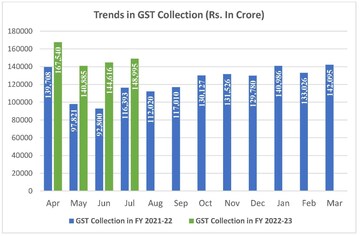
Come October 1, businesses with aggregate turnover exceeding Rs 10 crore will have to issue e-invoices for goods and services tax (GST). The government brought down the threshold from Rs 20 crore to Rs 10 crore to plug revenue leakages and ensure better tax compliance from businesses.
Announcing the lowering of the threshold, the finance ministry said in a notification that it has amended the rule on the recommendations of the GST Council.
At the 37th meeting on September 20, 2019, the council had recommended introducing electronic invoice (e-invoice) in GST in a phased manner.

Initially, e-invoicing was mandatory for firms with an annual turnover of Rs 500 crore. The threshold was later brought down to Rs 100 crore and then to Rs 20 crore.
According to officials, by next year, the government will bring down the threshold further to cover businesses with a turnover of Rs 5 crore, The Economic Times reported.
Revenue Secretary Tarun Bajaj had also told The Hindu BusinessLine that the government was working on stabilising the IT system ahead of bringing down the threshold to Rs 10 crore and further.
“The number of assesses between Rs 10 crore and Rs 20 crore would go up substantially, so we want to be sure that our IT system is good,” he had said.
E-invoicing sets a standardised format of generating an invoice that can be read by a machine. Through the electronic invoicing system, the Goods & Services Tax Network (GSTN) electronically authenticates B2B invoices for further use on the common GST portal.
Also read: Insurance stocks rise as investors feel higher GST on non-ICU rooms unlikely to hit sector much
Under the system, each invoice will be given an identification number by the invoice registration portal (IRP) to be managed by the GSTN. Invoices of businesses that do not comply with the e-invoicing mandate will not be valid. As a result, these businesses cannot avail input tax credit on the same and risk getting penalised.
In the last two years, tax officials had detected fake input tax credit of more than Rs 50,000 crore. The move will resolve mismatch errors and check tax evasion, The Economic Times quoted Saurabh Agarwal, tax partner at EY, as saying.



